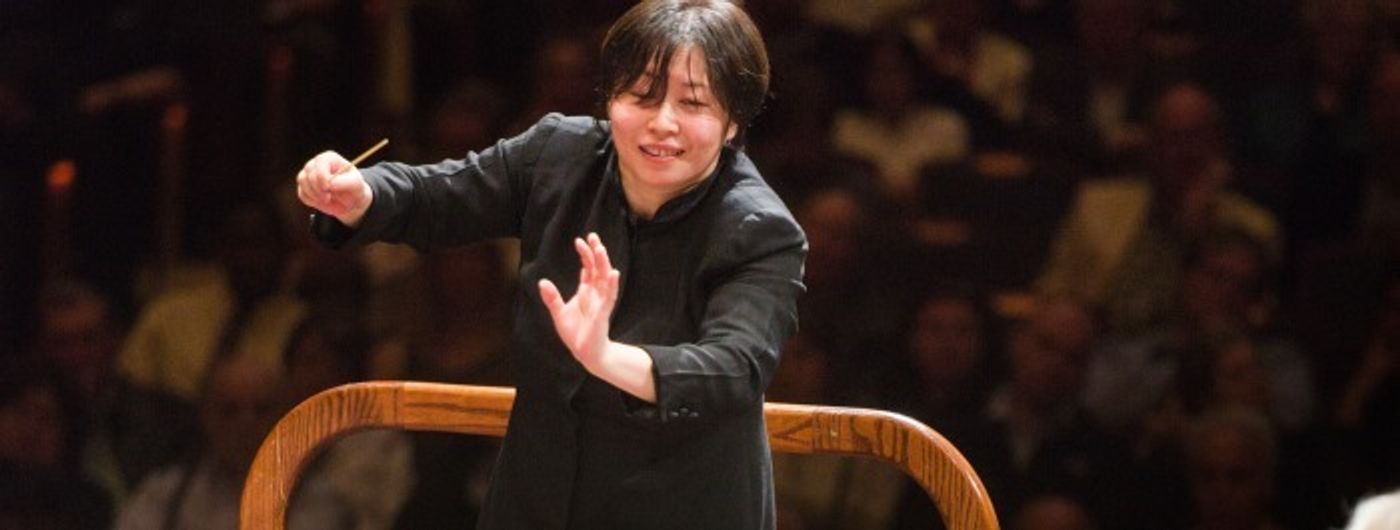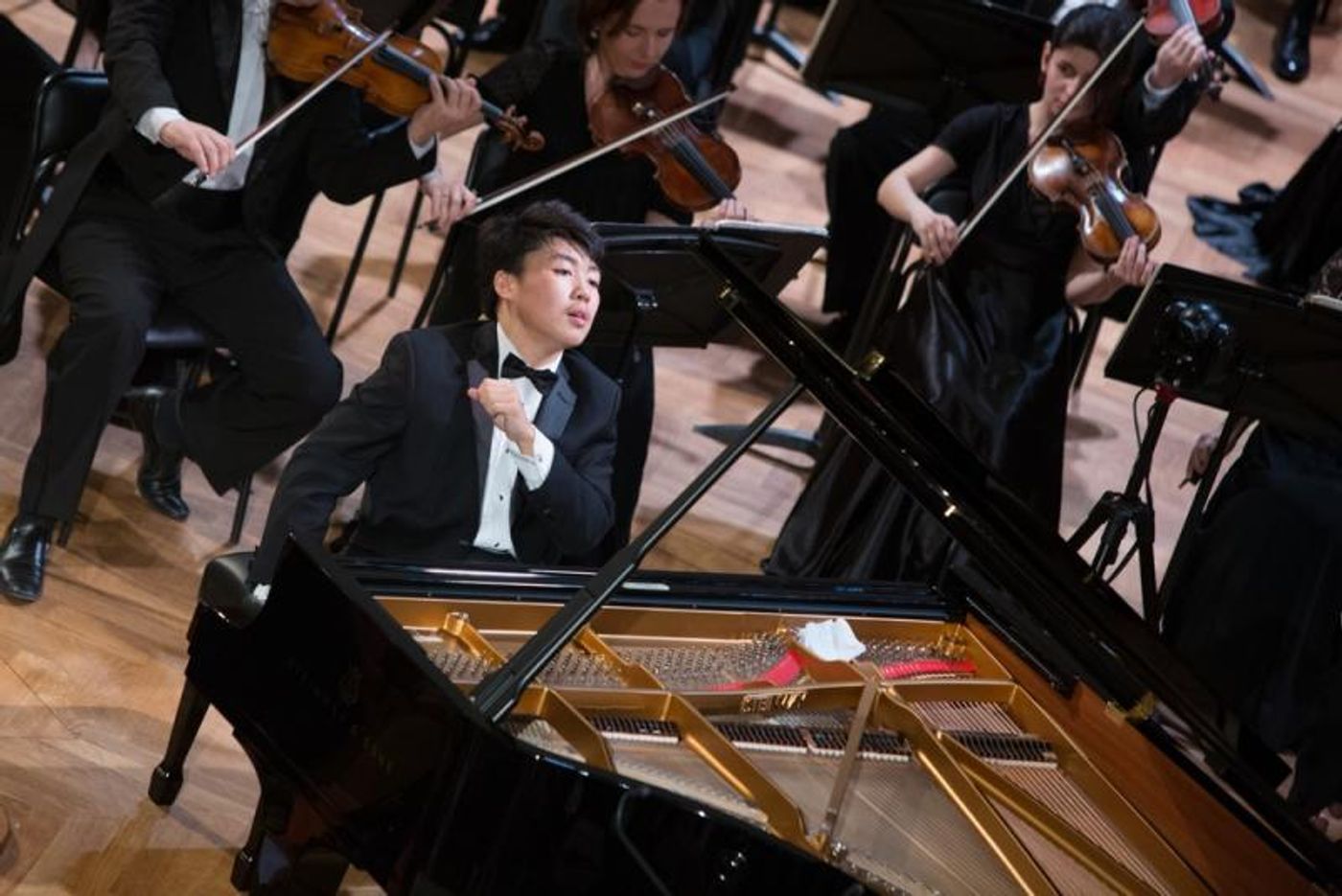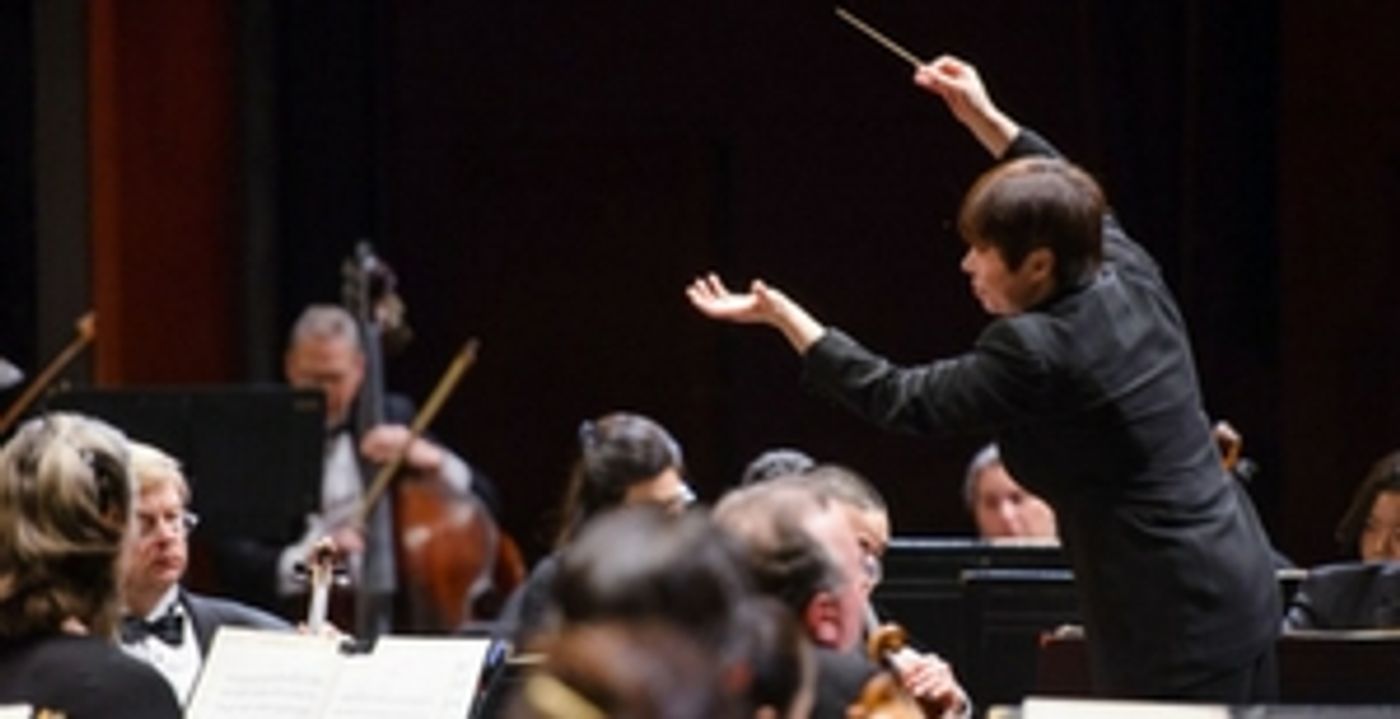Review: NEW JERSEY SYMPHONY ORCHESTRA, WITH PIANIST GEORGE LI at Bergen PAC

Occasionally a concert of stalwart popular favorites reminds you of what made them so special in the first place - providing a fresh look at a familiar landscape. The program presented by the New Jersey Symphony, under the baton of Musical Director Xian Zhang, at Bergen PAC on January 13th, did just that, reminding the rapt audience just how electrifying the standard repertory can be in the proper hands.
The evening began with the NJSO Premiere of a newer work entitled, "Ge Xu," by Chinese composer Chen Yi. Yi was the first Chinese woman ever to receive a Master Degree in music composition from the Central Conservatory of Music in Beijing and a finalist for the Pulitzer Prize for Music for her composition "Si Ji" (Four Seasons). It is difficult to accurately and fairly review such a complex piece on only one listening, let alone a first listening, thus, some observations will have to suffice.
The 1994 composition got off to slightly rocky start with some discord in the strings during in the opening notes, but shortly thereafter order was restored with the entrance of the woodwinds and harp. The mélange of layered melodies suggested an ethereal timelessness, which was soon brought to a halt in a dissonant chord, punctuated by a bracing burst of muted brass and gong. Pulsating strings and percussion followed, creating a distinctly forward momentum, in stark constrast to the opening. A section of violent solo percussion followed, out of which high swirling strings and fluttering flutes lead to a melody of bright brass.
Throughout the piece, Yi seems to use the quieter sections to build tension and ultimately release them through bursts of angry percussion. Conductor Zhang wielded her baton with the precision of a diamond cutter, keeping the varied and layered, difficult rhythms clear and distinct. At the conclusion, the brass completely dropped out to allow high strings, gentle bells and a sweet flute to create yet another hauntingly tense melody - with only a hint of distant percussion bringing back the sense of timelessness from the opening.
At the conclusion of the Yi piece, Zhang took to the microphone to explain the "America, Inspired" concept of the concert, and then introduced the soloist for the evening, young phenom, George Li. Mr. Li was the winner of the Silver Medal at the 2015 International Tchaikovsky Competition and was recipient of the 2016 Avery Fisher Career Grant. At 22, Mister Li has already performed with dozens of the world's leading orchestras under the batons of such luminary conductors as Michael Tillson Thomas, Gustavo Dudamel, and Valery Gergiev, to name just a few.
There are few adjectives that adequately describe Mr. Li's technical prowess, as seemingly effortless elegance marked every aspect of his interpretation of the concerto. The Prokofiev 3rd Piano Concerto is certain to become one of his signature pieces. Completed in late 1921 from sketches that date back to 1913, the piece was initially intended as a theme-and-variations, and elements of that early structure remain. Chronologically, the concerto follows Prokofiev's "Classical" Symphony, which although delightful, and featuring luscious neo-classical harmonies, is firmly rooted in the past. The concerto, by contrast, in very much a forward-looking piece in overall structure and harmony.

The work's originality may be somewhat forgotten owning to its seemingly ubiquitous presence in the concert halls for most of the 20th century (and 21st thus far as well - It was performed by no less than Martha Argerich and Yuja Wang in NYC in the last year alone). While Mr. Li may have lacked some of Argerich's titanic depth of expression, (hardly a slight for a 22 year old!) he certainly matched her dexterity and fluidity.
Prokofiev's placement of many of the rapid melodies in the highest upper registers clearly impacted many of the early Shostakovich Piano Concerti (which might make wonderful future repertory choices for Mr. Li.) Mr. Li's take on the Concerto was a rather up-tempo, percussive one, with detailed attentiveness to the myriad accents in the score, aggressive without losing sight of the ravishing orchestral accompaniment the composer provided as a bed, and as companion for the soloist.
From the opening andante clarinet, Zhang's crisp tempo in the first movement provided the perfect complement to Mr. Li's bright and brisk attack. The lithe conversational nature of the back and forth between soloist and orchestra was on point as both moved in sync with a pleasant flexibility throughout the first movement.
The second movement, which stresses the work's theme and variation origins, found the woodwinds on particular display and to great effect. The second movement is a broad-ranging combination of shorter and more divergent variations on a central theme and Mr. Li handled each thematic element from the more syncopated to the more delicately plaintive, with equal grace.
Mr. Li saved the best for last. The 3rd movement, opening with an animated allegro ma non troppo before expanding and intensifying into a more frenetic turbulento, allowed Mr. Li to really display the extent of his mastery of the piece. The thunderous chords (which evoked the 2nd movement's allegro giusto variation) shook the rafters, before giving way to the movement's extended, more traditional slow section. The gorgeous smoky nocturne which then hands the melody over to the strings as the piano adds layer upon layer of beautiful decoration may have been the highlight of the piece.
The exuberant grand finale of the piece saw Mr. Li playing the famous cascading double-note arpeggios (notoriously difficult) not merely effortlessly but with great joy. The audience rewarded Mr. Li with a well-deserved standing ovation. We hope this is only the beginning of a long and happy musical relationship between Mr. Li and the New Jersey Symphony!
The program's second half consisted of Ottorino Respighi's "Fountains of Rome" and "Pines of Rome" - two more early 20th century works. Ironically, only a few months ago, Ms. Argerich's performances also featured the two Respighi works in the second half of the program! What are the odds?
These tone poems rarely sound as convincing in recordings as they do live, largely because of the extraordinarily detailed and varied orchestration Respighi employed. In a live setting, and in the hands of a skilled conductor, the works shimmer and shine with a depth of color that recordings almost uniformly fail to capture. Zhang made the interesting choice to present the two pieces together without a break as one long flowing work. The result was fabulous. The ending of the Fountains flowed perfectly into the breath-taking opening of the Pines as if it was written that way. Removing the break added a spectacular sense of expansion from the order of civilization into the wonder of nature. The layers of woodwinds of the fountains, particularly the lovely flutes gave way to the marvelous spread of swirling strings and brass of the forest pines.

The surround-sound presentation only further highlighted the masterful orchestration utilizing piano, pipe organ, tubular bells, ratchet, as well as six brass players brilliantly situated in the mezzanine.
Zhang consistently drew forth dazzling sound from her orchestra, not merely in the fortissimo sections, but especially in the enchantingly tender moments which lay at the heart of both pieces - delicate and soft coloring, but never too quiet or difficult to discern. The result of this was an immensely satisfying and appropriately celebratory fanfare at the conclusion. Rather than simply relying upon a massive increase in volume for the climax, The Pines of the Appian, Zhang created a breathless anticipation of the coming explosion of sound, so when we finally reach that peak, it is revelatory and ecstatic rather than mere surprising. The finale was gargantuan in size and full-blooded in execution and, like much of Wagner and Strauss, must be heard live to really understand the composer's full intentions.
Zhang's tenure as musical director of the NJSO has already produced many memorable evenings of well-programmed and impressively performed music, this was among the best of them. The announcement of next season's schedule will come later this month. Here's hoping for many more such glorious evenings!
-Peter Danish
Reader Reviews
Videos

